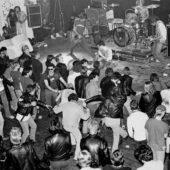Old Dominion Talks Riding Into the Battle for Listeners With ‘Coming Home’
From the first five rows at a concert, the life of a touring artist looks pretty glamorous – singing songs for an adoring audience and (maybe) for big bucks.
But plenty of performers insist that they play the show for free, and the pay is for the long hours stuck in a metal tube travelling down a lonely highway. That’s particularly true for artists who have a spouse and family waiting for them.
“I think the longest run we ever did was 67 days or something without coming home,” Old Dominion frontman Matthew Ramsey says. “It was brutal. I mean, those were the days where we were like, ‘I don’t even know where we are or care where we are.’
“We actually got to a random moment where we got to fly home for 24 hours. And we went home and then I learned, for me and for my kids and everybody, that was actually almost worse. Like, when you’re gonna go, go; and when you’re gonna be home, be home.”
Trending on Billboard
Of course, for country artists who live in Nashville, being home usually means there’s other work to do. Like recording new music. And beginning April 30, Old Dominion took over Sound Emporium to work on a single. They had one song they were prepared to cut, but they also had enough extra time booked to try and write something new. Writing in the studio had previously yielded “Make It Sweet” as well as the entire 2021 album Time, Tequila & Therapy. Hanging out in the Sound Emporium lounge, producer Shane McAnally (Carly Pearce, Sam Hunt) brought up a title he associated with returning home after a long absence. McAnally had read a book about the Vietnam War, and with each chapter, he imagined a soldier getting back from the front line.
“My favorite thing to watch online is people coming home from the service,” he says.
He had a three-word title, “War” – “I thought that was intriguing,” McAnally recalls – and he had the payoff, “Love you like I’m coming home from war.” “It was just a line,” McAnally says. “I had no clue what to do with it.”
The hook got a slight revision, “Kiss you like I’m coming home from war,” and Old Dominion’s Trevor Rosen started cycling through potential chord progressions. Once they settled on a path, they brought in the rest of the band – guitarist Brad Tursi, bassist Geoff Sprung and drummer Whit Sellers – to knock it out en masse.
They focused first on the chorus, slipping in a line about a “Midnight Rider” that kind of celebrates The Allman Brothers Band, even if it isn’t really about them. “They were road dogs like we are,” Ramsey says. “We have that connection.”
A couple lines later, they promised an intense return when Rosen sang “Katie, bar the door,” a phrase that proved surprisingly unfamiliar to part of the group. “Half the people in the room didn’t even know what that saying was,” Ramsey recalls. “I did, I think Shane did, I think maybe Whit did. But then Brad was like, ‘I don’t know what that means. But I don’t care. It’s cool.’”
They finished writing it in about 45 minutes, then moved into the studio to record it. Tursi established a jangly opening guitar riff, and McAnally made sure it didn’t get lost.
“As a group, they’re ADHD,” McAnally says. “If you put all those personalities together, it’s like, ‘Oh, what about this?’ ‘What about this?’ And no one’s ever going, ‘That’s great.’ With Brad especially, everything he starts to play sounds so cool. But he played that lick, and it described everything perfectly through a guitar lick. I knew what the song was. I think that was the extent of my – quote – ‘production.’ It’s was just going, ‘Do not change that.’”
Old Dominion made several musical choices that reflected the song’s lyrics. Chief among them was the decision to lean toward a ragged, high-energy sound rather than precision. “That is a constant discussion amongst us in this band, as to how slick do we want to be?” Ramsey says. “And how much do we just want to be a band?”
But the text also created a dilemma in the song’s rhythmic build-up. Sellers started with a light, steady beat that grew more intense. By the end of the track, he bashed the snare with a wild exuberance, but the guys disagreed on where to make that transition. One notion was to hit the crash-and-burn motif at the first chorus, 42 seconds in. But anyone who’s gone home knows the emotion gets stronger as the destination approaches; maxing out early would destroy that effect. Ultimately, they waited until the second chorus – past the song’s halfway point – for Sellers to hit full rock-‘em-sock-‘em mode.
“Sometimes,” Ramsey says, “you have to have that discussion of, ‘OK, it feels really good, but is it serving the message of the song as best as possible? Are we paying attention to the lyric, rather than just going in there?’ Because we love slamming and rocking the hell out of it.”
To help ramp up more gradually, Sellers and Ramsey recorded hand claps that arrive during the first chorus.
“We have funny video footage of the two of us around this mic,” Ramsey says, “and as we’re doing it, the mic stand starts to droop and stuff. It’s slowly just lowering down, and he and I are both clapping, but we’re slowly squatting to match the level of the microphone.”
Tursi also added a gurgling six-string banjo part at the start of the second verse that helps lift toward that all-out energy. One additional percussive nuance came when McAnally floated the idea of dropping militaristic snare rolls after the “coming home from war” hook. Sellers took the cue, making them apparent, but not too obvious.
“I very much took the chance of being laughed out of the room, because it’s so on the nose,” McAnally recalls. “Whit did it right then, way better than I heard it. He made it subtle – it doesn’t hit you over the head – but when you’ve listened to a few times, you’re like, ‘Oh, that does kind of put me in a place of being at an Army base.’”
One other major decision came with the instrumental solo. A harmonica seemed to fit the ragged goal, but they weren’t initially sure who to hire. Ramsey, who used to play harmonica during his pre-Old Dominion days in Virginia, volunteered, providing an earthy Bob Dylan/Bruce Springsteen dimension to the track on his second take.
“It’s not like I’m a virtuoso,” he says with a laugh. “I was like, ‘Just let me give it a shot.’ I went in, and I played it, and then I could hear everybody in the control room going, ‘What the fuck was that, man? We’ve known you for 25 years, and you’ve never told us that you could do that.’”
Old Dominion and the team agreed that “War” was a better choice for a single than the other song they cut, but there was some pushback on the title. Provocative as the word was, it didn’t represent what was happening in the song. They ultimately settled on “Coming Home,” and Columbia Nashville released it to country radio via PlayMPE on June 27. It rests at No. 47 on the Country Airplay chart dated July 27.
“It’s a full-band effort, and we’re trying new things, harmonicas and all that stuff,” Ramsey says. “We feel like we’re known for bringing some joy, and happiness, and light and levity, and coming off of ‘Can’t Break Up Now,’ it just felt like, ‘Gosh, we got to pick things up.’”


















